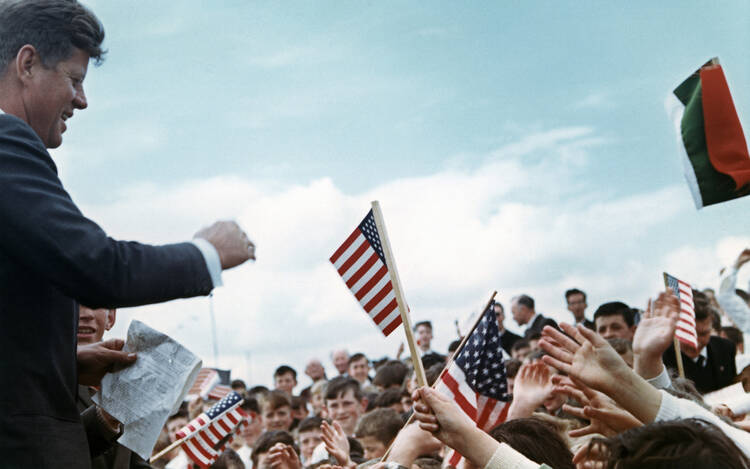The polarization of American politics continues to be a fertile topic for researchers, with one new study suggesting that our online dating habits contribute to the red-vs.-blue schism. At the Mischiefs of Faction blog, study co-author Casey Klofstad summarizes the findings:
. . . parents pass their political preferences on to their offspring through socialization and through their genes. Consequently, the more we pair off with partners who share our political preferences, the more likely we are to pass those shared preferences on to future generations. In other words, like-seeks-like mating can lead to increased political polarization over time. If we are more easily able to find partners like ourselves by “shopping” for them online, Internet dating could hasten this process.
But this isn’t really new. Klofstad and his colleagues note that few online dating profiles even mention politics (“a larger proportion voluntarily described themselves either ‘heavy set,’ having ‘a few extra pounds,’ or ‘stocky’ than listed ‘politics’ as one of their interests”) and that political alignment usually occurs when people seek other similarities that happen to coincide with partisan leanings.
Indeed, given the geographic polarization in American politics (specifically, the urban/rural divide), one is likely to find a mate with similar views simply by limiting one’s search to a few miles.
Klofstad’s paper (see PDF) also uses an older example that’s familiar to me as the son of an Irish-ancestry father and French-Canadian-ancestry mother who both grew up in urban areas of New England and idolized the Kennedy family:
Catholics may like to marry other Catholics, and since until recently Catholics were more likely to affiliate as Democrats, they end up aligning on politics as well as religion.
American Catholics are not as politically predictable these days, though I suspect that it’s still probable that two single Catholics in the same parish would belong to the same party, Democratic or Republican.
Since same-party couples have been around for a long time (most of the adults I knew as a kid had similar views to their spouses, and this was before the “polarization” crisis set in), I doubt that more inter-partisan marriages are going to bring us back to the days when Lyndon Johnson or Richard Nixon could get legislation passed by working with members of the opposite party. Polarization is a choice made by party leaders and activists. Leave the poor people looking for love out of it.
Christine Quinn’s “raw deal” from voters
The monolithic Catholic vote of yore could be called a kind of tribalism, and as I noted in last week’s post on the New York mayoral election, tribalism used to make city politics a lot easier to predict.
It was striking that City Council Speaker Christine Quinn, who would have been the city’s first female and first gay mayor, lost the female vote and the gay-and-lesbian vote last week to primary winner Bill de Blasio, according to exit polls.
Nevertheless, New York magazine’s Lisa Miller argues that Quinn, considered the front-runner until voters started to pay attention to the campaign, was done in by sexism. “Noting about her candidacy merited a failing grade,” writes Miller, ignoring that the ability to attract votes is the usual criteria by which to measure the success of a campaign.
Miller compares Quinn to a presidential candidate:
I submit that Christine Quinn is exactly the kind of woman that people don't like. She may be qualified, but she’s bossy and brash. She has an annoying voice, weird hair, and ill-fitting clothes. She wants what she wants, and she wants it too much. In these particulars, she is reminiscent of another female politician who lost in a 2008 primary to another smooth-talking man with a telegenic family. The loathing directed at Hillary Clinton has long been out of proportion to her qualifications and has focused on aspects of her womanhood that people have found lacking: her moods, her hair, her marriage, her domestic skill set.
The problem with arguing that Quinn and Clinton suffered the same kind of discrimination is that Quinn lost among Democratic primary voters in New York City—the same electorate that give Hillary Clinton a 55-43 victory over Barack Obama in the 2008 presidential primary (see PDF).
So Quinn did poorly among voters who were willing to put Hillary Clinton in the White House. Unless Miller wants to argue that sexism in New York City has significantly increased since 2008, I don’t think that public perceptions of Clinton explain how Quinn lost. My advice to female aspirants for executive office anywhere: Don’t acquire the baggage of being a legislative leader, and don’t align yourself too closely to a leader (in this case, Michael Bloomberg) that voters are growing tired of.
Photo of President John F. Kennedy visiting Ireland in 1963 from Catholic News Service.








